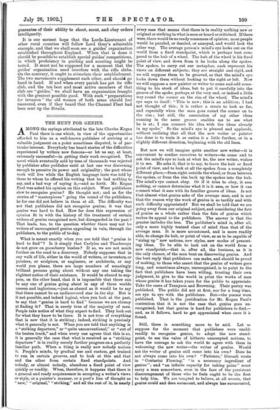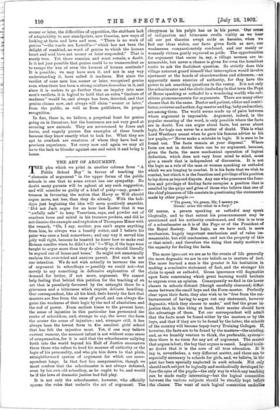THE HUNT FOR GENIUS.
AMONG the sayings attributed to the late Charles Kegan Paul there is one which, in view of the opportunities afforded to him as a well-known publisher of arriving at a valuable judgment on a point sometimes disputed, is of par- ticular interest. Everybody has heard stories of the difficulties experienced by writers now famous—or let us say, at least, extremely successful—in getting their work recognised. The novel which eventually sold by tens of thousands was rejected by publisher after publisher until at last one was discerning enough to perceive its power and originality ; the poet whose work will live while the English language lasts was told by those to whom he offered his writing that he had nothing to say, and a bad way of saying it,—and so forth. Mr. Kegan Paul was asked his opinion on this subject. Were publishers slow to recognise genius ? He thought not ; and as for the stories of " masterpieces" going the round of the publishers, he for one did not believe in them at all. The difficulty was not that publishers did not recognise genius; it was that genius was hard to find. How far does this expression of opinion fit in with the history of the treatment of certain writers of genius recognised now, but disregarded in the past ? That leads, too, to the question whether there may not be writers of unrecognised genius appealing in vain, through the publishers, to the public of to-day.
What is meant exactly when you are told that " genius is hard to find"? Is it simply that Carlyles and Thackerays do not grow on gooseberry bushes ? If so, we are not much further on the road to a discovery. Nobody supposes that in any walk of life, either in the world of writers, or inventors, or painters, or sculptors, or engineers, or architects, or any world you please, there are large numbers of amazingly brilliant persons going about without any one taking the slightest notice of their existence. It would be absurd to sup- pose, on the other band, that it is impossible that there can be any one of genius going about in any of these worlds unseen and inglorious,—just as absurd as it would be to say that there cannot be an undiscovered star in the sky. But is it not possible, and indeed logical, when you look at the past, to say that " genius is hard to find " because we are clumsy at finding it ? That is surely true of the majority of men. People take notice of what they expect to find. They look out for what they know to be there. It is not true of everything that is new that it is striking; indeed, striking is precisely what it generally is not. When you are told that anything is a "striking departure," or " quite unconventional," or " out of the beaten track," and when every one agrees that this is so, it is generally the case that what is received as a "striking departure" is in reality merely further progress on a perfectly familiar path. When a thing is really new nobody notices it. People's minds, by gradual use and custom, get trained to run in certain grooves, and to look at this and that and the other from certain fixed standpoints. And nobody, or almost nobody, abandons a fixed point of view quickly or readily. When, therefore, it happens that there is a general and ready acquiescence in accepting a writer's views or style, or a painter's manner, or a poet's line of thought as " new," " original," " striking," and all the rest of it, in nearly every case that means that there is in reality nothing new or original or striking in what is seen or heard or criticised. If there were, there would be no ready consensus of opinion; most people would be puzzled, or dazzled, or annoyed, and would look the other way. The average person's mind's eye looks out on the world from a fixed standpoint, which is perhaps best com- pared to the hub of a wheel. The hub of the wheel is his fixed point of view, and down from it he looks along the spokes. The spokes, to carry out our metaphor, each represent his views on different subjects; they are straight and rigid, and we will suppose them to be grooved, so that the mind's eye looks down them without looking to the right or left. Now we will suppose a new painter or writer to come and add some- thing to his stock of ideas, but to put it carefully into the groove of the spoke, perhaps at the very end, or indeed a little way round the corner on the rim of the wheeL The mind's eye says to itself : " This is new; this is an addition ; I had not thought of this ; it is rather a strain to look so far, and especially when the man goes round the corner on to the rim ; but still, the association of my other ideas running in the same groove enables me to see what he is at ; I can connect his idea with the ideas already iu my spoke." So the mind's eye is pleased and applauds, without realising that all that the new writer or painter has done is to train it or entice it a little further, or in a slightly different direction, beginning with the old lines.
But now we will imagine quite another new writer—it is convenient to confine ourselves to writers—to come and to ask the mind's eye to look at what he, the new writer, wishes it to see. He asks it, that is to say, to leave the hub or fixed point of view, and to look at all the spokes from a completely different place,—from right outside the wheel, or from between the spokes, or from the rim back up the spokes into the hub. The mind's eye cannot obey. Or if it tries to obey, it sees nothing, or cannot determine what it is it sees, or how it can connect what it sees with its familiar groove of ideas. Is not that almost what genius asks of the average man, and is not that the reason why the work of genius is so tardily and with such difficulty appreciated? But we shall be told that we are going away from our original subject, and considering the fate of genius as a whole rather than the fate of genius which makes its appeal to the publishers. The answer is that the greater includes the less. The publisher's mind is, after all, only a more highly trained class of mind than that of the average man. It is more accustomed, and is more readily able, to change its hub, or point of view, so as to be capable of "sizing up " new notions, new styles, new modes of present- ing ideas. To be able to look out on the world from a new standpoint,—that is, after all, the business, as it is the only chance, of the man bent on discovering genius. And the best reply that publishers can make, and should be proud of making, to those who assert that the genius of writers goes long, and sometimes always, unrecognised, is to point to the fact that publishers have been willing, trusting their own judgment, to give to the world in print the works of men whose genius it has taken years for the public to appreciate. Take the cases of Tennyson and Browning. Their poetry was published. The public did not at first, nor for a long time, see eye to eye with the publishers. But—the poems were published. That is the justification for Mr. Kegan Paul'e contention that it is not the case that genius goes un- recognised, but that genius is hard for publishers to find,— and, as it follows, hard to get appreciated when once it it found.
Still, there is something more to be said. Let UE suppose for the moment that publishers were unable readily to recognise genius, to adopt the new stand- point, to see the value of hitherto unaccepted notions, tc have the courage to ask the world to agree with them in welcoming the new writer—the writer of genius. Would not the writer of genius still come into his own ? Does he not always come into his own ? "Patience," Disraeli wrote in " Contarini Fleming," " is a necessary ingredient of genius "; and "an infinite capacity for taking pains" must carry a man somewhere, even in the face of the persistent discouragement of those who he feels ought to be the first to help him. We are tempted to believe, at all events, that genius could and does surmount, and always has surmounted,
sooner or later, the difficulties of opposition, the stubborn lack of adaptability to new standpoints, new theories, new ways of looking at facts and laws and men. " There is no work of genius "—the words are Lowell's—" which has not been the delight of mankind, no word of genius to which the human heart and soul have not sooner or later responded." That is surely true. Yet there remains, and must remain, a doubt. Is it not just possible that genius could be so transcendent as to escape the ken of even the keenest of human sentinels ? It is possible; we may have seen it, and not in any way understanding it, have called it madness. But since the verdict of sane men has, sooner or later, recognised genius even when there has been a strong mixtura dententiae in it, and since it is useless to go further than an inquiry into sane men's verdicts, it is logical to hold that an extra " tincture of madness" would be, and always has been, detected, and that genius claims now, and always will claim " sooner or later," from the public, as well as from publishers, its proper recognition.
In fine, there is, we believe, a perpetual hunt for genius going on in literature, but the huntsmen are not very good at securing new animals. They are accustomed to foxes and hares, and eagerly pursue fine examples of these breeds because they know exactly what to look for. What they are apt to overlook are creatures of whom they have had no previous experience. Yet every now and again we may all have the luck to blunder against one and catch it and bring it home.







































 Previous page
Previous page